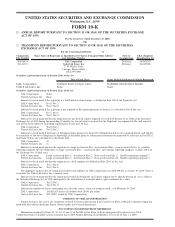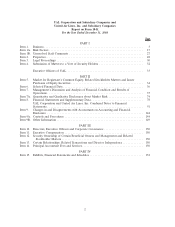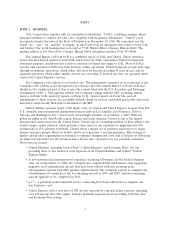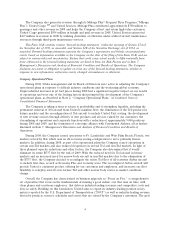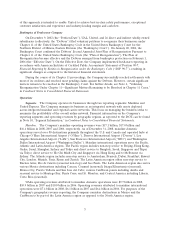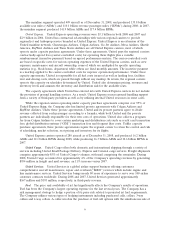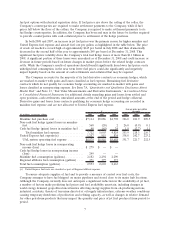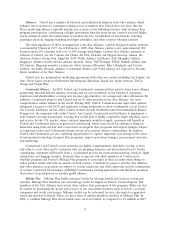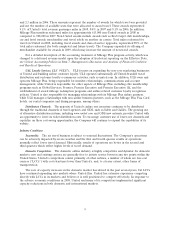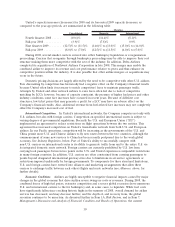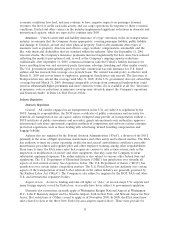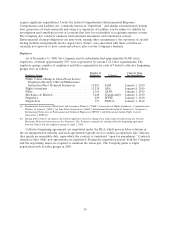United Airlines 2008 Annual Report Download - page 6
Download and view the complete annual report
Please find page 6 of the 2008 United Airlines annual report below. You can navigate through the pages in the report by either clicking on the pages listed below, or by using the keyword search tool below to find specific information within the annual report.The mainline segment operated 409 aircraft as of December 31, 2008, and produced 135.8 billion
available seat miles (“ASMs”) and 110.1 billion revenue passenger miles (“RPMs”) during 2008; in 2007,
the mainline segment produced 141.9 billion ASMs and 117.4 billion RPMs.
United Express. United Express operating revenues were $3.1 billion in both 2008 and 2007 and
$2.9 billion in 2006. United has contractual relationships with various regional carriers to provide
regional jet and turboprop service branded as United Express. United Express is an extension of the
United mainline network. Chautauqua Airlines, Colgan Airlines, Go Jet Airlines, Mesa Airlines, Shuttle
America, SkyWest Airlines and Trans States Airlines are all United Express carriers, most of which
operate under capacity purchase agreements. Under these agreements, United pays the regional carriers
contractually-agreed fees (carrier-controlled costs) for operating these flights plus a variable
reimbursement (incentive payment) based on agreed performance metrics. The carrier-controlled costs
are based on specific rates for various operating expenses of the United Express carriers, such as crew
expenses, maintenance and aircraft ownership, some of which are multiplied by specific operating
statistics (e.g., block hours, departures) while others are fixed monthly amounts. The incentive payment
is a markup applied to the carrier-controlled costs for superior operational performance. Under these
capacity agreements, United is responsible for all fuel costs incurred as well as landing fees, facilities
rent and deicing costs, which are passed through without any markup. In return, the regional carriers
operate this capacity on schedules determined by United. United also determines pricing, revenues and
inventory levels and assumes the inventory and distribution risk for the available seats.
The capacity agreements which United has entered into with United Express carriers do not include
the provision of ground handling services. As a result, United Express sources ground handling support
from a variety of third-party providers as well as by utilizing internal United resources in some cases.
While the regional carriers operating under capacity purchase agreements comprise over 95% of
United Express flying, the Company also has limited prorate agreements with Colgan Airlines and
SkyWest Airlines. Under these prorate agreements, United and its prorate partners agree to divide
revenue collected from each passenger according to a formula, while both United and the prorate
partners are individually responsible for their own costs of operations. United also collects a program
fee from Colgan Airlines to cover certain marketing and distribution costs such as credit card transaction
fees, global distribution systems (“GDS”) transaction fees and frequent flyer costs. Unlike capacity
purchase agreements, these prorate agreements require the regional carrier to retain the control and risk
of scheduling, market selection, seat pricing and inventory for its flights.
United Express carriers operated 280 aircraft as of December 31, 2008, and produced 16.2 billion
ASMs and 12.1 billion RPMs during 2008, while producing 16.3 billion ASMs and 12.6 billion RPMs in
2007.
United Cargo. United Cargo offers both domestic and international shipping through a variety of
services including United Small Package Delivery, Express and General cargo services. Freight shipments
comprise approximately 85% of United Cargo’s volumes, with mail comprising the remainder. During
2008, United Cargo accounted for approximately 4% of the Company’s operating revenues by generating
$854 million in freight and mail revenue, an 11% increase versus 2007.
United Services. United Services is a global airline support business offering customers
comprehensive aircraft maintenance, repair and overhaul (“MRO”) services which include engine and
line maintenance services. United Services brings nearly 80 years of experience to serve over 100 airline
customer contracts worldwide. During 2008 and 2007, United Services generated approximately
$167 million and $183 million, respectively, in third-party revenue.
Fuel. The price and availability of jet fuel significantly affects the Company’s results of operations.
Fuel has been the Company’s largest operating expense for the last several years. The Company has a
risk management strategy to hedge a portion of its price risk related to projected jet fuel requirements.
The Company utilizes various types of hedging instruments including purchased calls, collars, 3-way
collars and 4-way collars. A collar involves the purchase of fuel call options with the simultaneous sale of
6

